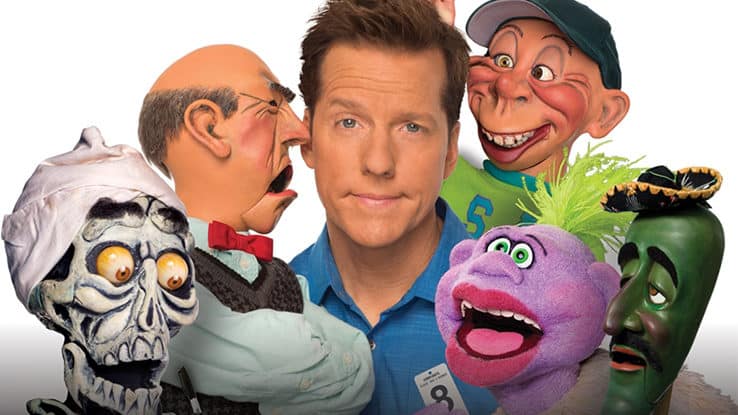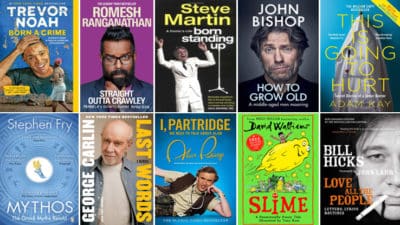Comedy

Interview
Ventriloquist Jeff Dunham prepares for the UK
He'll be playing two live shows this month.
Jeff Dunham has spent thirty plus year shaking up the world of ventriloquism. To many seen as entertainment for the youngsters, Dunham discovered early into his career that character and situation comedy was the way forward. Setting himself an goal to appear on The Tonight Show, he pushed forward with his atypical art.
Some years later, Jeff Dunham is selling out arenas across the globe, playing to close to twenty thousand fans at recent US dates, as well as becoming a regular on the likes of Comedy Central. He’s joined by his cast of unruly characters, not least Bubba J, Achmed the Dead Terrorist and Peanut. His characters, he insists, are to be taken with a pinch of salt. He mocks the most extreme individuals, rather than culture. “If I don’t know anything about it I’m not going to make fun of it,” he says.
Dunham is currently preparing to bring his unique show to the UK for two dates in May. He’ll be taking to Birmingham and London on the 19 and 20 May respectively, armed with his family of dysfunction.
Ahead of the shows, we caught up with Dunham to find out more about what first attracted him to ventriloquism, creating his characters, and what fans can expect from his live performances.
What first attracted you to the art of ventriloquism?
I saw a ventriloquist on TV when I was eight or nine year old. Something about the dummy and the ventriloquist appealed to me. Because I was an only child, there was nobody back then to tell me that interest was a little odd, so I didn’t see any problem with it. Admittedly it’s a bit of an odd profession and a little bit quirky, but I thought “what the heck, this seems like fun”. I got a dummy that year and started practicing.
I was one of those unremarkable kids. I wasn’t popular with the girls… I wasn’t a popular kid. I wasn’t good at sports. There were no outstanding qualities as a third grader. And then I’d learned this skill of ventriloquism and started doing these shows; book reports and presentations and talent shows at school. I started to get some notoriety and laughs, and a little more acceptance. So there was no reason to quit.
In the fourth grade I started making some money out of doing shows at birthday parties, and it just went on from there.
How did that develop to where you are now?
When I was younger it was cute to see a little kid making a dummy talk and telling jokes. It wasn’t until after college and I moved out to Los Angeles, and I realised that if I was really going to compete in this show business world, I had to move beyond the skill of ventriloquism and the uniqueness of it, and make the act funny so people would want to keep coming back. That’s when I started focussing on characters and jokes.
Was it difficult to break into the comedy scene as a ventriloquist?
Absolutely. There was a stigma against ventriloquists, which is kind of understandable. It’s very easy to learn the skill of ventriloquism, but it’s very difficult to be entertaining and funny. When a stand-up comedian begins his only indicator of success is if they are getting laughs or not.
A ventriloquist, unfortunately, can get up on stage and still do the skill and wouldn’t realise that the performance is failing. Some people think that by learning the skill they’re in show business, but that’s like going to the art store, buying supplies and saying you’re an artist. It doesn’t work like that.
There’s a stigma because you’ve got a prop. A lot of comedians don’t think it’s pure comedy if you’re holding something to present. I look at it differently now. It’s an advantage because it’s different. It’s not stand-up it’s situational. It’s more like a sitcom on television.
What keeps you coming back to the art after thirty plus years?
Because it works, and I have fun with it. There aren’t many people who do what I do, and do it well for a living. To be in the upper echelon of the handful of people who do it for a living is just flat out fun. I guess that’s the bottom line. I don’t see it as a job. I see it as a hobby that turned into something I get paid for.
Where does your comedy draw from?
Thematically we all worry about the same things. We all worry about family, our jobs, the economy, our kids, our relationships, so all those jokes are universal. My first real world tour, where we went to 40 different cities in 5 different continents, it was amazing to me how universal so many of these themes are.
Is that where the characters come from?
I’m trying to react to what’s going on in society. The first example of that was Bubba J, my stupid character. Back when Bill Clinton was President here they called him Bubba because he was from Arkansas. All the people make the fun of it for being a little slow, but I’m from Texas so I can say that. Bubba J was my reaction to everyone calling Clinton Bubba.
And then of course Achmed the Terrorist was a reaction to 9/11. The first incarnation was dead Osama Bin Laden, and then I turned him into Achmed. I always make it a point to say he’s not Muslim. I’m making fun of the guys who did the terrible thing. I don’t like to step into religion because everybody has their own right to belief. If I don’t know anything about it I’m not going to make fun of it.
All my characters are generalities that people understand.
Where’s the weirdest place that art has taken you?
The one time I wondered why I was there, the first time I was on The Tonight Show with Johnny Carson – that was out big late night talk show for years – I had set a goal for myself 10 years before to get on that show. I’d worked for ten years since high school and finally my dream was coming true. It was a Friday night and it couldn’t have gone any better.
The next morning I had to fly across the country to go do an afternoon show in a cafeteria at a tiny little college. One of the students came up to me after the show and asked if I was on the Tonight Show last night, and he said “why are you here?”. I had no answer for him.
How are you feeling about coming to the UK?
I’ve been there a good number of times doing shows, and again I’m always delighted by how warm and accepting audiences are. There’s always been such a warmth there.
I get to see the world through rose coloured glasses because people are there for the comedy. I’ve done many world tours, and they make me realise that the only thing the world needs to come together is an alien force attacking the palace, then we’d realise there’s a lot of good in the world that nobody focuses on. To have so many people, and so many cultures coming to the shows and laughing at the same material, that makes what I do worthwhile.
Going back to your question of why I keep coming back to what I do, because it’s fun and I love it. To be somewhat at the top of the game, meaning I’ve never had more fun, there’s just no reason to quit.
Jeff Dunham will be headlining two shows in the UK later this month.
19 May 2018 – Genting Arena, Birmingham
20 May 2018 – SSE Arena Wembley, London
Tickets for Jeff Dunham’s UK shows are available now through Ticketmaster.co.uk.









